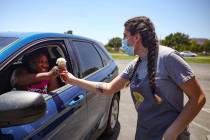Las Vegas tied the record daily high Tuesday amid an excessive heat warning, according to the National Weather Service.
mc-weather
Excessive heat is forecast for the Las Vegas region on Labor Day, Tuesday and perhaps longer, according to the National Weather Service.
Increasing heat will become excessive heat across the entire Las Vegas region from Monday morning through Tuesday evening, according to the National Weather Service.
A excessive heat warning has been issued for the entire Las Vegas region from Monday morning through Tuesday evening, according to the National Weather Service.
Labor Day weekend will start out on the pleasant side in Las Vegas before warming up by the actual holiday, according to the National Weather Service.
Temperatures will be close to normal in the Las Vegas Valley before warming on the holiday weekend, according to the National Weather Service.
The Las Vegas area could get showers and thunderstorms on Tuesday, according to the National Weather Service.
The extensive heat warning has been extended through Monday in the Las Vegas Valley, according to the National Weather Service forecast.
Two days of excessive heat are in store for the Las Vegas region before some moisture could arrive, according to the National Weather Service.
Excessive heat will bear down on the Las Vegas region through Sunday, according to the National Weather Service.
Excessive heat will make a return to the entire Las Vegas region for most of the weekend, according to the National Weather Service.
Wildfire haze will be a factor in Las Vegas on Thursday, albeit perhaps a bit less than on Wednesday, says the National Weather Service.
Smoke from California wildfires is expected to drift into town this week, blanketing the Las Vegas skies on Tuesday.
A pleasant Sunday is forecast with below-normal temperatures and sunny skies in the Las Vegas Valley, according to the latest National Weather Service forecast.
Air quality conditions improved across the Las Vegas Valley on Saturday and are expected to keep getting better, says the National Weather Service.

















